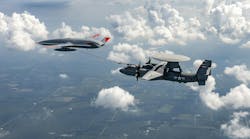By Annie Turner
At the time of writing, MBDA, the pan-European missile group, was expected to post higher than expected earnings. According to The Financial Times, sales are expected to be above $4.3 billion, up from $2.33 billion in 2002. The return on sales is running at more than 7 percent, up from 1.4 percent in 2002, which is impressive. Still, the theory remains that in the long term, the only way the company can continue to compete successfully is by consolidating its operations in France, Italy, and the United Kingdom, which is when the fur and feathers will really start to fly-if what’s happening with EADS and the United Kingdom government is anything to go by.
MBDA is jointly owned by EADS (the Franco-Hispanic-German group), Finmeccanica of Italy, and the United Kingdom’s BAE Systems. The former EADS boss, Noel Forgeard, had a grand plan to buy out the other two owners. However, Airbus plunged into crisis, dragging EADS’ considerable European defense ambitions with it, and Forgeard lost his job before he had the chance to carry out his scheme.
Initially, BAE was keen on the sale of MBDA, but changed its mind: MBDA provides missiles for the 72 Eurofighters sold by BAE Systems to Saudi Arabia. This is a profitable business, apparently immune from government investigation to boot. Anyway, since Airbus has consumed so much of EADS’ resources, it probably couldn’t afford to buy out the other two anyway and the low dollar exchange rate isn’t helping EADS to compete against the likes of Boeing, either.
BAE’s exit from Airbus didn’t go down well with the United Kingdom government or EADS, which felt betrayed by BAE pulling out as crisis hit while the government is anxious about job losses. However, EADS has no choice but to streamline all its operations in the fall-out from Airbus. As part of this, closing down the Filton plant, near Bristol in England, has been mooted by EADS.
The United Kingdom government argues that Filton has long been a center of excellence for aircraft wing production, but this is a hollow argument because the Airbus A350’s wings will not be made from aluminum, like the wings previously built there, but from composite materials. EADS already has facilities in Germany, and Spain already geared up to use them. From this point of view, relocation looks like a sensible plan.
Lord Drayson, the United Kingdom minister in charge of $31.34 billion annual defense budget, has other ideas. He took the somewhat unusual step of making it clear to the workers at Filton that should the European group make any such move, it would feel the consequences. For instance, EADS headed up a consortium bidding for a contract for a new fleet of refueling tankers for the Royal Air Force. So far, the negotiations have been protracted because of the complex nature of the deal, but amicable. That might not continue, nor the contract be secured if EADS doesn’t play ball.
Lord Drayson firmly believes that jobs and intellectual property should remain in the United Kingdom and he could also revise his opinion concerning the contract for 25 military-transport aircraft (A400Ms), awarding the maintenance and support contracts to a third party, to underline his point.
EADS is between a rock and a hard place. The French and German economies are weaker than that of the United Kingdom, so EADS will face bitter opposition to any job losses in either of its home markets too, both of which have far more onerous employment legislation and much stronger unions than the United Kingdom.
Nor do EADS’ woes end there. Northrop Grumman, EADS’ bidding partner for a U.S. Air Force contract potentially worth as much as $100 million, has thrown its toys out of the pram too. Northrop is threatening to pull out of the bid altogether unless the Air Force alters the terms of the bid, which it argues is biased toward Boeing, because the contract looks at cost simply in terms of initial outlay, not ongoing operation. Ironically, Boeing was originally awarded the contract, way back in 2001, but it was retracted after a procurement scandal.
EADS must wonder where to turn next. When both partners and customers have the knife into you, who needs enemies? Yet to rub salt into EADS’s wounds, in mid January, it was announced that arch rival Boeing had won more orders for aircraft last year than Airbus, for the first time since 2000. The only crumb of comfort for EADS is that, as one pundit commented, Boeing itself survived a near-death experience not long ago, but is now flying, in every sense.
Rosoboronexport takes control
The Russian state defense export agency, Rosoboronexport, has regained its monopoly of the country’s foreign military sales after a decree issued by President Vladimir Putin, reversing a decree issued in 2005. Other companies will be allowed to serve out extant agreements, but will not be able to enter into new deals without the involvement of the state monopoly.
According to the Forecast International Military Market Report published at the end of October, President Putin has overseen the Russian defense industry’s reorganization under the Kremlin’s control, with Rosoboronexport as its agent. The agency already deals with 60 countries, mostly in the Middle East and Asia, but it is making progress in Africa and Latin America. Russian arms sales reached a post-Soviet peak of $6.1 billion in 2005, reflecting a steady rebound from 2003 when they totaled $4.4 billion. Defense exports are expected to reach $5.5 billion in 2006, escalating to $7 billion in 2007, according to the report.
The restoration of Rosoboronexport’s monopoly over export matters continued President Putin’s policy of centralized control. The agency is heavily dependent on the Chinese and Indian markets, taking advantage of the European Union’s arms embargo on China, which looks like it will go on indefinitely. The greatest threat to the Russian arms trade in India is that the Indians become self-sufficient, building up their own arms industry.
Certainly, the Russians wouldn’t want to upset either of its biggest customers, but it is in a sticky situation. China is keen to resell Russian jets to Pakistan, but the Indians would take a very dim view of this indeed. At least now the Russians can speak with one diplomatic voice.


